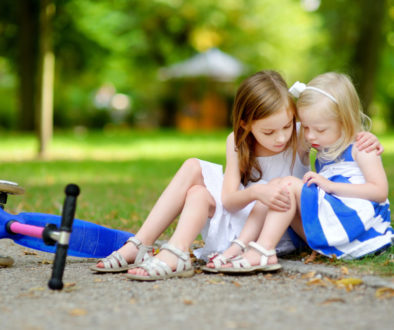Toddlers and Impulse Control

Has your child ever made a beeline for the electrical outlet you’ve repeatedly told him not to touch? Has your toddler ever hit another kid over a toy dispute? Have you ever caught your little one pouring water out of the tub right after you told her not to? These are all examples of the, developmentally appropriate, lack of impulse control.
Toddlers have such little self-control because the part of the brain responsible for taking control over the emotional, impulsive part of the brain is not fully developed in children under 3. Therefore, young children are much more likely to act on their desires, such as yanking a toy out of a friend’s hand, instead of reasoning with themselves on why that is not the right thing to do. Children don’t actually develop this kind of self-control until 3.5 to 4 years of age, and even then, they still need a lot of help managing their emotions and impulses. One major factor that can increase the frustration level for parents is the “expectation gap”; the expectation of what you believe your child can do vs. what your child can actually do.
Once you understand what is developmentally appropriate and your expectations are in line with your child’s abilities, life with a toddler can be less stressful. It can be helpful to remember that your child is acting their age; and not just “misbehaving,” or purposefully trying to drive you crazy. Young children need a lot of patience and guidance to learn to manage their impulses. Here are some ideas for building self-control in your little one:
1. Understand that being a toddler isn’t easy.
Toddlers have very little say or control over what happens in their world, like getting in the car seat, stopping play to take a nap when they don’t feel tired, or sharing their toys. Be empathetic and show your child that you understand: “You are really frustrated that we can’t go to the park today.” “You are mad that I won’t let you have a cookie for breakfast. I totally get that.” “You are really upset that you have to give the toy back – you really wanted to continue playing with it.” Giving your child the words to describe their feelings while also validating them, is the first step toward helping them manage their emotions and develop self-control.
2. Get moving and play games that require impulse control.
Exercise and movement affect focus and attention. Regular physical activity also improves concentration and motivation, decreases hyperactivity and impulsivity, and improves memory. Try simple games like “Red Light, Green Light” or play “freeze dance” with music. Reading books about children who get angry or have tantrums can be impactful, and then use that opportunity to talk about how to handle big feelings. Pretend play is also a great opportunity to teach self-control. Remember that children learn through play so spend a little time each day to engage your child in play – it will help to deepen your connection while also teaching valuable lessons.
3. Get to know your child’s triggers.
Some toddlers have a hard time with transitions, while others have a hard time at big gatherings or adjusting to new experiences. Become aware of what situations tend to trigger challenging behavior from your child. Making small adjustments to daily routines, like not going to a restaurant with an overtired toddler, can help to reduce challenging behaviors, by offering more ‘Yesses’ and fewer ‘Nos’.
4. Be clear with age appropriate limits and natural consequences.
Your child may not be able to follow a rule just yet, but it is still important to set clear expectations. Try to use the approach that you are teaching and guiding your child while using clear and natural consequences as reinforcement. Stay calm, keep it simple and be clear (“No throwing toys. If you throw the toy, I will put it away for 5 minutes”). If your child continues with the behavior, which is not only likely but also normal (children test boundaries so that they can learn what the limit is), calmly follow through with the consequence. It is with consistency and practice that children develop the brain connections they need to master the skill of self-control.
5. Make it clear that hurting others is not allowed.
When your child gets mad while playing and pushes or hits another child or you, take him aside and remind him that hurting others is not allowed and that hands are not for hurting. Instead help your child think of new ways to solve problems. Remember that ALL feelings are ok, but not ALL behaviors are ok.
6. Model self-control.
Be a role model. Your child learns many behaviors from observing you. When you model self-discipline and self-control in difficult situations, your child will learn to follow your example. Learning to be aware and manage your own feelings is the best way to help your child develop self-control. Taking a breath and responding thoughtfully, rather than reacting, is one important way that parents can have an impact on how their little ones learn to navigate difficulties.
The lack of impulse control can be one of the more frustrating parts of parenting because it’s hard to understand and it can sometimes feel like intentional misbehavior. The next time you are having a particularly difficult day and feel your patience dwindling, try using this simple phrase; “My child isn’t giving me a hard time, my child is having a hard time.” Sometimes a change in perspective can help with how we are able to see our child, and as a result how we respond.





